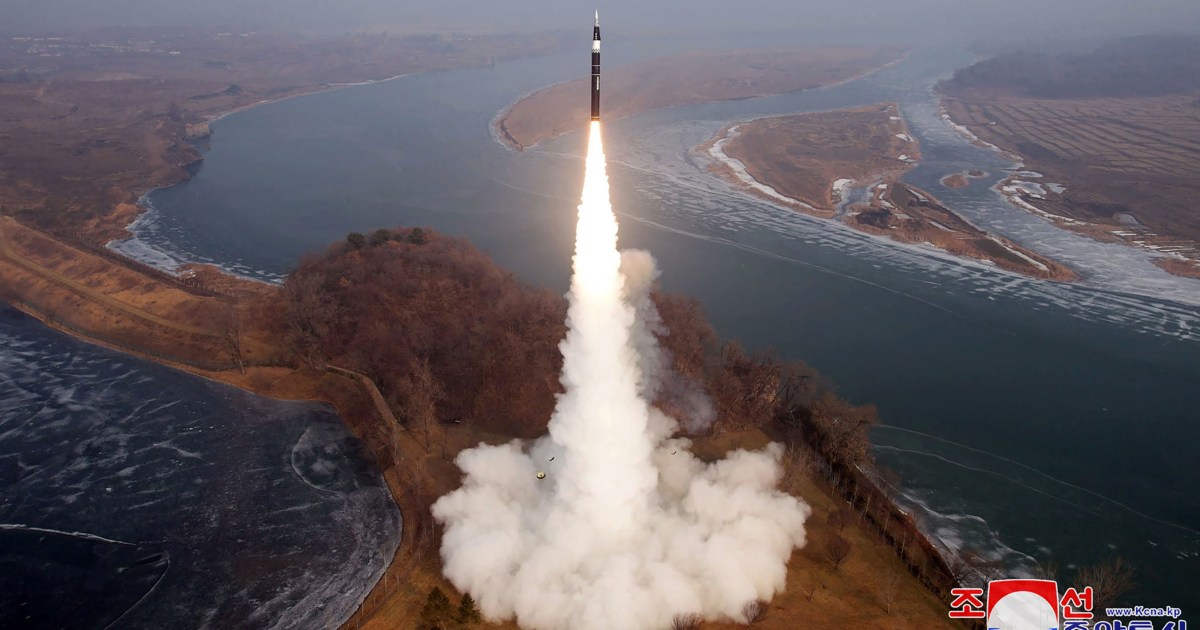New intermediate-range hypersonic missile made with lighter materials, making it more lethal at penetrating enemy defences, Pyongyang says.
North Korea has carried out the successful test launch of a new intermediate-range hypersonic missile and will accelerate the development of nuclear and missile capabilities, state media report.
The hypersonic missile was fired from the outskirts of Pyongyang on Monday. It flew about 1,500km (932 miles) at 12 times the speed of sound, reaching an altitude of nearly 100km (62 miles) before descending to a “second peak” of 42.5km (26.4 miles) and manoeuvring to hit a target in waters off the country’s east coast, the Korean Central News Agency (KCNA) reported on Tuesday.
New carbon fibre composite materials were used in the missile’s engine section, KCNA said, adding that it can “effectively penetrate any dense defence barrier and inflict a serious military blow on the opponent”. Carbon fibre is lighter and stronger than other aerospace materials such as aluminium, but is more difficult to manufacture.
South Korea’s military said the KCNA report was most likely exaggerated, estimating the range the missile flew to be about 1,100km (683 miles) and saying no second peak was detected. Achieving a “second peak” would imply the North Korean missile was capable of changing course and maintaining altitude rather than directly descending on a ballistic trajectory.
Analysts said the new missile launch was concerning because it included technology few nations have access to.
“What’s so alarming about this missile is that this technology is currently possessed only by Russia, China, and the United States,” said Yang Moo-jin, president of the University of North Korean Studies in Seoul.
“What’s especially impressive about this technology is that… achieving such speeds requires materials that can withstand extreme conditions,” Yang said.
According to South Korea’s Yonhap news agency, the country’s Joint Chiefs of Staff (JCS) did concede that North Korea appears to have made some “technological progress in its hypersonic weapons” programme and did not rule out Russian assistance in that achievement.
Russia and North Korea signed a mutual defence agreement last year and US, Ukrainian and South Korean intelligence have claimed that more than 10,000 North Korean soldiers and conventional weapons systems have been sent to support Moscow’s war on Ukraine. Concerns have also intensified recently that Russia could transfer more advanced weapons technology to North Korea.
A detailed analysis of the missile test would be conducted with the United States, South Korea’s main military ally, the JCS said.
North Korea leader Kim Jong Un, who presided over the test launch by monitoring the operation via teleconference video alongside his young daughter, said the missile was part of the country’s defences.
“This is clearly a plan and effort for self-defence, not an offensive plan and action,” Kim said, according to KCNA.
“The development of new-type hypersonic missile is mainly aimed to steadily put the country’s nuclear war deterrent on an advanced basis,” he said.
Monday’s test launch was the first since November, when North Korea test-fired what it said was its most advanced and powerful solid-fuel intercontinental ballistic missile (ICBM).
North Korea has been developing new solid-fuel missiles amid an intensifying race for the next generation of long-range projectiles that are difficult to track and intercept.
